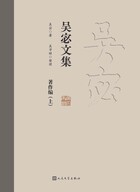
中国文学现状
Present State of Chinese Literature
I.Down to 1900, China, in “splendid isolation” has developed a literature of her own—rich & highly finished, the Embodiment of her ideas & Expressions of her civilization.
The Characteristics of Chinese Literature(to me):
1.Humanism
2.Highly moral
3.Limited Perfection of Beauty
II.Marquis 曾国藩, the last great representative figure of Chinese literature.
His character & many-sided achievements.
III.The literary (complicated with political, economic & social) history of China from 1900 to 1930.今暂不作.
IV.General Impression of the whole field of Chinese literature today:
(i)Confusion & Heterogeneity.
(ii)Co-existence & mixture of all Forms of Expressions & all types of thoughts & feelings.
V.Classification according to Forms.
1.Problem of the language.
i.Different from West.viz.European language—Esperanto
(International utopian) Romanization.
ii.Difficulty to learn (?) Inherent or Method?
Phonetics. Real solution: Communication & more efficient teaching.
Adult Education
Mandarin
iii.No Grammar (?)
iv.For expressing new (west.) thoughts & feelings.
v.For which of new literature
2.The Literary Revolution & the Vernacular literature: Its Reaction & the Real Solution.
3.文言白话之 Co-existence & mixture.
4.Rhyme & Meter in Poetry: the Vernacular Free-Verse.
Experiment & Endeavor.
5.Problem of Styles:Old(1) 六朝体;(2)古文体;
New(1) 全欧化;(2)半欧化;
(3)俗语; (4) 旧白话.
VI.Classification according to Matter: Thought & Expression.
1.Ultra - conservatives
2.中学为体,西学为用。
3.兼收并览,审慎别择。(Critical attitude: comprehension & selection.)
4.研究旧籍,以新法整理。Its abuses:反古,立异。
5.Ultra - Radical: Communists: 焚书
VII.Classification according to the Union of Matter & Form:
1.Old style, old thought
2.Old style, new thought: 学衡派(宓)
3.New style, old thought: (胡适)
4.New style, new thought:
VIII.General Arbitrary Grouping, with leading figures (persons)
(左)
无产阶级文学 (since 1928)
讽刺派 (鲁迅)
颓废派(郁达夫、曾朴)创造社
近世派 (浪漫派,加以聪明) 徐志摩 新月派
近世派 (功利派,加以考据) 胡适 新月派
中立兼收派(研究,了解,同情,批评)《东方杂志》 梁启超
《大公报·文学副刊》
标准派(人视为复古派):中国文学——学衡派
西洋文学——学衡派
(求其最善者而今品合之)
旧派江湖先生,雅俗文人——樊增祥
旧派道学家——梁济
以孔教及君主为理想之旧派学者文人——陈三立、郑孝胥、康有为
旧派经学考据家——马其昶
(右)
中国文学现状
1930年12月
一、直到1900年,中国在“绝妙的隔离”中发展出属于自己的文学——丰富而极其优秀,她的思想的体现和她的文明的表达。
中国文学的特点(对我而言):
1.人文主义
2.道德性强
3.有限的形式完美
二、曾国藩,中国文学的最后一位伟大代表人物。
他的品格和多方面的成就。
三、1900—1930年中国文学史(因加上政治、经济、社会因素而愈发复杂)。今暂不作。
四、当今整个中国文学界的总体印象:
(i) 混乱和多样。
(ii)所有表达形式和所有类型的思想和感觉的共存和混合。
五、按形式分类。
1.语言问题。
i.与西方不同,与欧洲语言——世界语(不同)
(国际乌托邦)罗马化。
ii.难学 (?) 固有问题还是方法问题?
语音学。真正的解决方案:沟通和更有效的教学。
成人教育
普通话
iii.没有语法(?)
iv.用于表达新的(西方)思想和感受。
v.对于哪一种新文学
2.文学革命与白话文学:引起的反动,与真正的解决方案。
3.文言白话之共存与混合。
4.诗歌中的韵律:白话自由诗。
实验与努力。
5.文体问题:
旧(1)六朝体;(2)古文体;
新(1)全欧化;(2)半欧化;(3)俗语;(4)旧白话。
六、按内容分类:思想与表达。
1.极端的保守者
2.中学为体,西学为用。
3.兼收并览,审慎别择。
4.研究旧籍,以新法整理。其滥用反古,立异。
5.极端的激进派 :共产主义者:焚书。
七、根据内容与形式的统一来分类:
1.旧风格,旧思想
2.旧风格,新思想:学衡派(宓)
3.新风格,旧思想:(胡适)
4.新风格,新思想:
八、 随意的大致分组,各自的领军人物
(下)
无产阶级文学 (自1928年以后)
讽刺派 (鲁迅)
颓废派(郁达夫、曾朴)创造社
近世派(浪漫派,加以聪明)徐志摩 新月派
近世派 (功利派,加以考据)胡适 新月派
中立兼收派(研究,了解,同情,批评)《东方杂志》 梁启超
《大公报·文学副刊》
标准派(人视为复古派):中国文学——学衡派
西洋文学——学衡派
(求其最善者而今品合之)
旧派江湖先生,雅俗文人——樊增祥
旧派道学家——梁济
以孔教及君主为理想之旧派学者文人——陈三立、郑孝胥、康有为
旧派经学考据家——马其昶
(上)
——本文原为1930年12月吴宓在英国爱丁堡大学应邀介绍“中国文学现状”所作的演讲概要,铅笔书于纸片,经年累月,纸稿磨损,字迹模糊不清,幸蒙专家友好赐助辨认,得以整理翻译如上,谨此致谢。